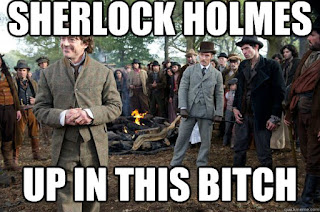Like
many people in this class, I have never really read Sherlock Holmes prior to
coming to this class. Most people do not fully know his stories and background
but we’ve heard about the name Sherlock Holmes being referenced to many things.
Since I am the type of person who watches crime-solving shows all the times, I’ve
developed an interest in knowing the character and what he was all about.
Sherlock
Holmes paved the way for many of the shows that airs on television nowadays. Almost
all the top-rated shows airing now are based on some sort of crime solving plot,
whether it’s NCIS or Hawaii-five-O (Hawaii five-O is awesomeeee). Like I stated above, I enjoy watching these
kinds of shows a lot. One of the shows relatable to Sherlock Holmes that I really
enjoy is Forensic Files. Like Sherlock Holmes, Forensic Files focuses on cases
that are almost unsolvable. The crimes being solved on this show uses all sorts
of scientific methods that goes above and beyond to bring justice for the
victims. Although, Sherlock solves his cases way faster, there are still some
similarities between the two.
After
reading the stories, I’ve began to like Holmes more. One thing that I like is
how he approaches the crime scenes. For example, in the story A Study in Scarlet, Detective Holmes
began to look at the pavement and garden leading up to the house before he even
met with the inspectors. This shows that he doesn’t rule out anything that
could potentially help solve crimes. Another characteristic that I find very
interesting is how he makes predictions based on just what he saw. After Holmes
arrived to the crime scene later, he began to make connections based on what he
just saw. Some of the things he stated was the height, cause of death, size of
feet. I think this is where people lost interest in the Sherlock because those
things are just impossible to confirm based on the time the stories were
created. It’s obvious that no human can make those assumptions just based on eyesight
but I try not to look at it from that point of view. when it comes to fictional
stories, I like to think of it as reality. It just makes the story better and
makes all the outrageous claims more believable.






